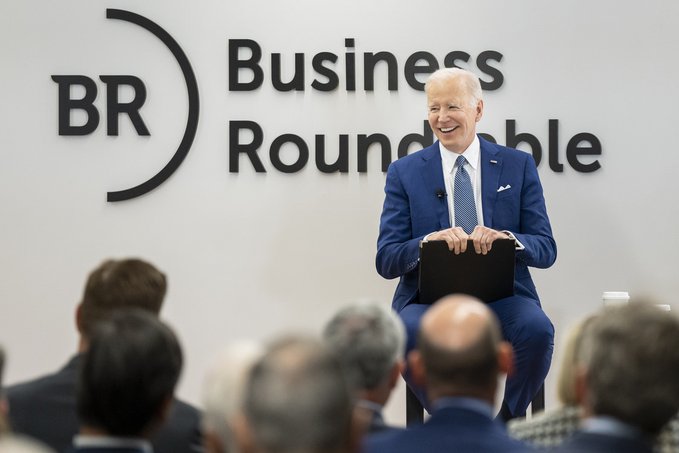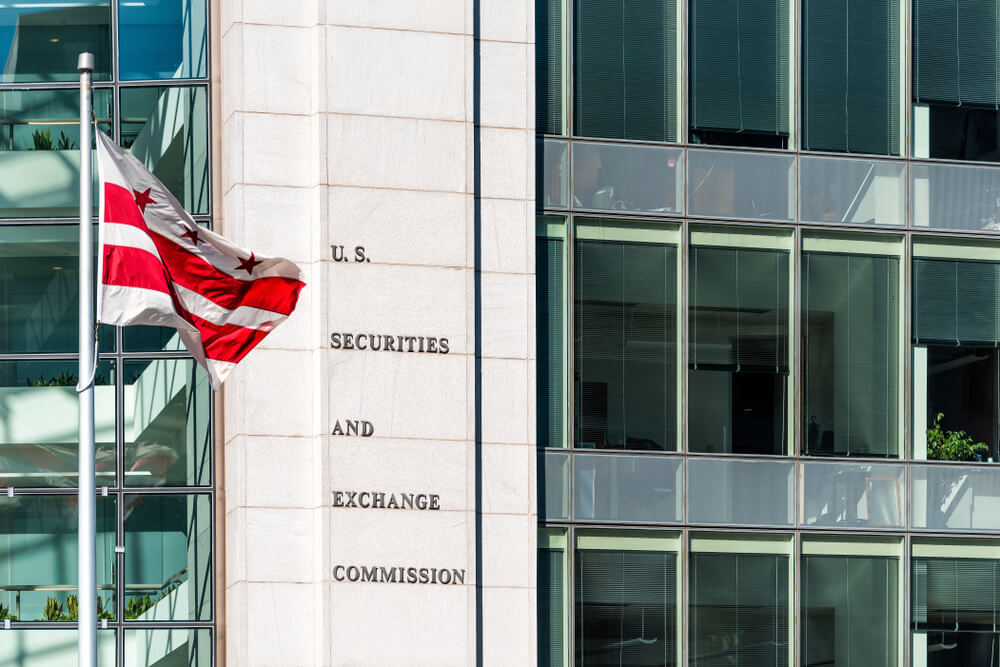ImpactAlpha, Aug. 3 – So much for stakeholder capitalism.
The CEO lobbying group Business Roundtable has perhaps predictably reverted to form with its opposition to tax provisions in the Inflation Reduction Act, a pro-growth bill that aims to boost U.S. competitiveness in technologies vital to the low-carbon transition by investing in a wide swath of clean energy sectors.
Less than 24 hours earlier, the Roundtable had offered its full throated approval to another boost for national competitiveness, the CHIPS Act, which aims to bolster U.S. semiconductor manufacturing. “With the U.S. economy contracting and inflation soaring, it’s vital for Congress to support pro-growth and pro-investment policies,” declared the roundtable’s Joshua Bolten.
The difference? The Inflation Reduction Act includes a 15% minimum corporate tax for companies with over $1 billion in sales (significantly lower than the official U.S. corporate tax rate of 21%). The Roundtable called on Congress to reject the minimum tax it said “would undermine proven bipartisan incentives that encourage capital investment.”
With much fanfare in 2019, the Business Roundtable unveiled a pledge signed by more than 200 CEOs, committing themselves to “an economy that serves all Americans.” It was taken as a signal that “the purpose of the corporation” had shifted from the 40-year era of “shareholder primacy” to a new age of “stakeholder capitalism.” Such stakeholders, the Roundtable said, included employees, suppliers, customers and the communities in which they live, as well as shareholders.
Any reasonable definition of respect for such stakeholders includes paying one’s fair share of taxes to support the provision of public goods.
The Roundtable’s opposition is all the more curious given that many Roundtable member corporations stand to benefit from the climate-action legislation. The group’s chair is Mary Barra, who as CEO of GM has staked her legacy on the auto giant’s plans to go all-electric by 2035. The IRA eliminates the caps on tax credits for electric vehicle buyers and makes funding available to convert factories for EV production.
That’s apparently not enough for GM. The company reported $7.4 billion in profits in 2020, but paid just just $577 million, or 7.8% in taxes, as Popular Information’s Judd Legum points out. More than 50 of the most profitable corporations paid zero taxes in 2020.
“Any publicly traded corporation that is involved in undermining the Inflation Reduction Act is exhibiting a particularly pernicious form of short-termism,” Majority Action’s Eli Kasargod-Staub told ImpactAlpha. Such opposition, he said, “quickly erases any credibility that companies have gained on climate governance – which will leave responsible shareholders with little choice but to hold their boards of directors accountable.”
Pro-opportunity
And don’t label as “pro-business” the Business Roundtable, the Chamber of Commerce and other lobbyists who are taking aim at the Inflation Reduction Act (for context see, “Pro-business has a new meaning now”).
In West Virginia, a group of local advocates, labor groups and energy CEOs made an authentically pro-business, pro-worker case to bring U.S. Sen. Joe Manchin on board.
“If we want to benefit from the investments and the jobs that are going to come with that transition, we need to be part of the proactive solutions and policies rather than constantly playing on defense,” Brandon Dennison of West Virginia-based economic development firm Coalfield Development Corp. told Politico.
Dennison’s team has built a family of social enterprises prototyping a diverse West Virginian economy. Coalfield offers steady work, training and education, mentorship and a pathway to ownership in a company that is building homes, installing solar, and growing and selling food (see, “Transforming coal country, one social enterprise at a time”).
Among those pressing Manchin to get on board were traditional energy companies like Duke Energy and Constellation Energy, as well as Bill Gates-backed Breakthrough Energy-backed Form Energy, a battery storage startup that demonstrated to Manchin’s team what the bill would mean for the company’s growth in West Virginia. Gates personally pressed Manchin, according to Politico.
Accelerating investment
One group licking their chops over the climate package: Climate tech investors.
“The proposed Inflation Reduction Act of 2022 is a monumental investment in climate that provides an unequivocal signal to the private sector to build and invest in clean energy,” wrote Breakthrough Energy.
In its weekly newsletter, Climate Tech VC examined how the bill shapes climate innovation with a line-by-line breakdown across seven verticals.
“While it doesn’t get us to Paris targets, it does give a pretty meaningful accelerant, particularly at the bookends of venture capital’s involvement via innovation funding and customers’ tax incentives,” write the authors. Despite supply chain issues and inflationary pressure, global investment in renewable energy hit a record $226 billion in the first half of 2022, according to BloombergNEF’s Renewable Energy Investment Tracker.
The bill, added Shayle Kann of Energy Impact Partners, “makes rapid decarbonization cheaper for pretty much everyone.”
For at least some climate tech investors, that upside seems to outweigh the heartburn of losing the lucrative “carried interest” tax loophole for private-equity and venture-capital fund managers, as the bill proposes. The loss of the carried interest loophole is said to be a major reason for the hesitation to back the bill of U.S. Sen. Kyrsten Sinema of Arizona. With the Senate split 50-50, Democrats can’t afford to lose even a single vote.
“I’m a VC. I benefit from the current carried interest tax code,” tweeted Fifty Years’ Seth Bannon. “If raising taxes on me means we get $370B invested in clean energy, clean transportation, energy storage, and other climate tech, LFG!”
If it’s not clear from the context, that’s short for “Let’s f**king go!”
Be brave
The lobbying and political activities of corporations are now closely scrutinized, by shareholder activists as well as state and local officials of all political stripes.
“Business needs to up its game on the climate policy front in these closing moments,” writes Bill Weihl of workforce advocate ClimateVoice in Greenbiz. “We have the know-how and the solutions to address this crisis.”
Effective climate action is business-critical risk mitigation, Clara Miller, the president emeritus of Heron Foundation, argued in ImpactAlpha earlier this year in a to-do list for CEOs who claim to be seizing the moment on climate action.
“Companies that make pro-green announcements yet lobby against climate legislation (yes, that would include Microsoft, sadly along with Apple, Disney, Amazon and more) should not only stop lobbying against such measures, but must lobby for them,” Miller wrote. “Those who don’t do this are misleading shareholders, customers, and employees.”
Chief executives of private and public companies and institutions have placed themselves in leadership roles, Miller said. “Now’s the time to lead.”
“Explain to your boards and shareholders and friends in government why we must move quickly. Level with them about what it will mean. Be willing to invest and take risk for the long term, even when it means a short-term loss. Walk your own talk.”
“It’s hard, but it’s possible,” she adds. “Be just a little bit brave.”











